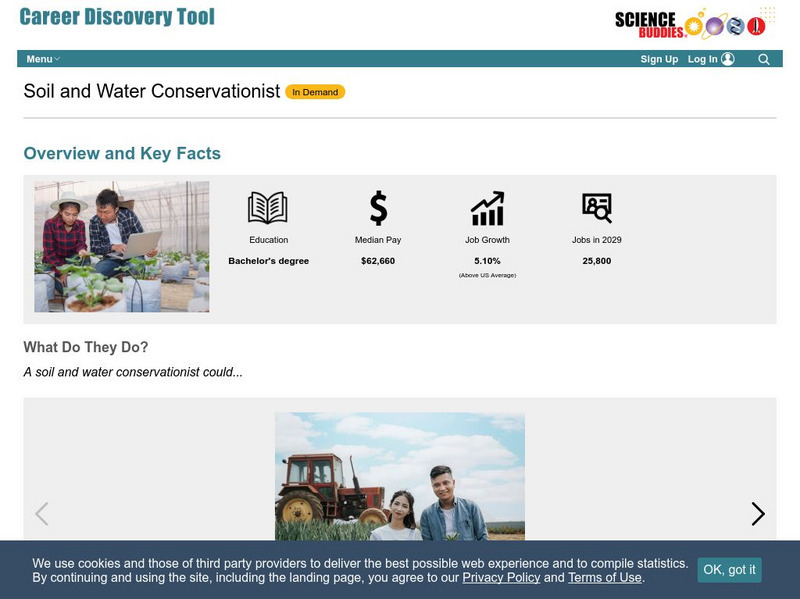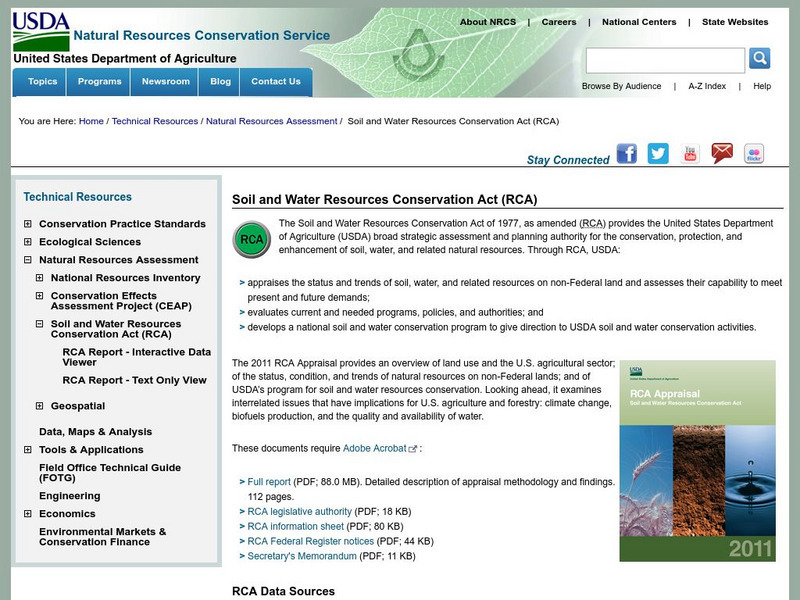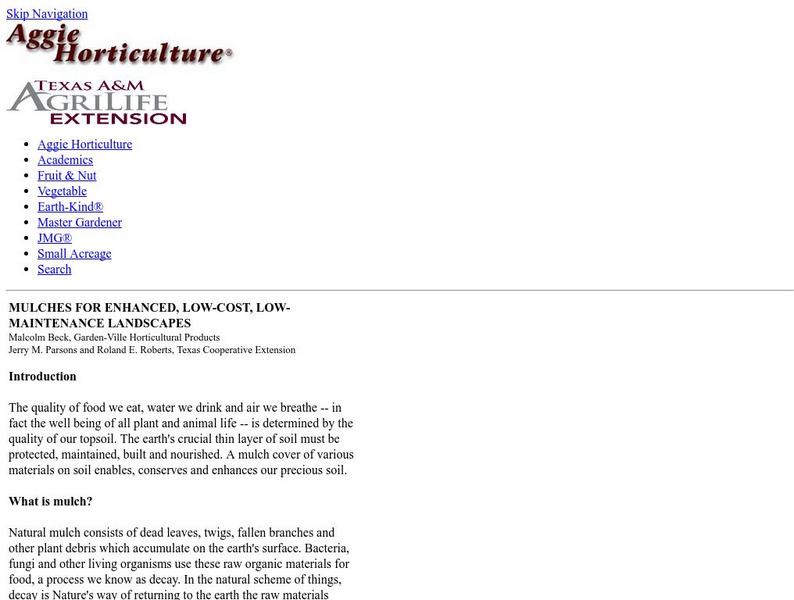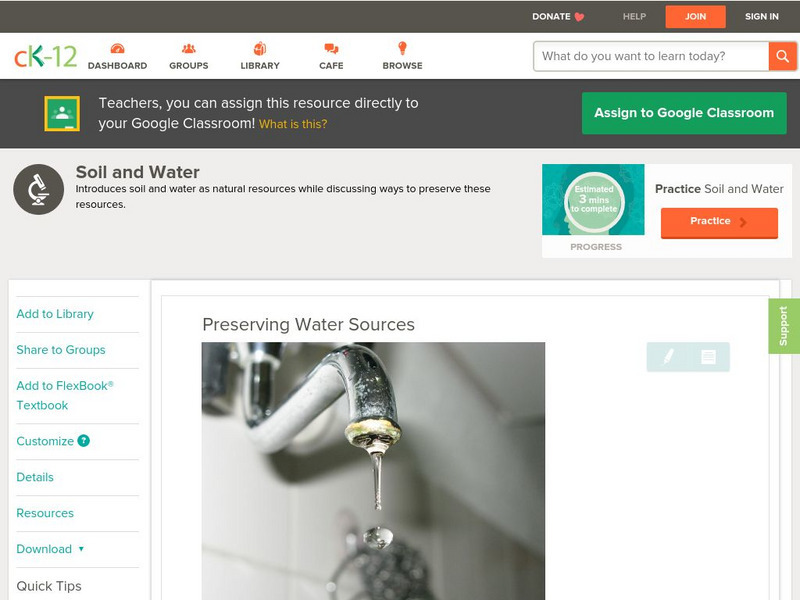Hi, what do you want to do?
Curated OER
Earth Pockets
Students identify the Earth's natural resources. In this Earth science lesson, students read the book The Great Kapok Tree and discuss types of natural resources. Students use categories such as wood, paper, and trees and list items that...
Curated OER
Martha Who?
Young scholars explore how the number and types of organisms an ecosystem can support depends on the resources available and on abiotic factors, such as quantities of light and water, a range of temperatures, soil composition. They are...
Curated OER
Erosion
Fifth graders study the effects of running water on erosion. They examine how the soil on the playground is affected by erosion and determine how the placement of trees and shrubs changes the path of erosion. In their science journals,...
Curated OER
Growing Corn
Sixth graders create a Venn diagram of different soil types. They plant cord seeds in clay, sand, and fertile black soils are record their growing rates. After two weeks they discuss the effects of soil types on the growth process.
Curated OER
Solar
Students study solar energy. For this renewable energy lesson students complete several lab activities using different controls and variables.
Curated OER
Using Our Natural Resources Wisely
Students understand how ground water can be recycled to maximize its usage and begin to think about ways conservation can help Kansas preserve its natural resources in other areas - soil, minerals, and clean air.
Curated OER
Sustainability
Fifth graders investigate the concept of natural resources. They participate in a simulation project to see possible uses. They use the internet to study how Hacienda Verde is used as a model for others for sustainable coffee crops.
Curated OER
The Trail of a Snack Food
Students identify some of their favorite snack foods. Using this information, they discover the resources needed to produce the food. In groups, they research different alternatives to make their favorite food in order to protect the...
Curated OER
Mushrooms Can Save the World
Students use mushrooms to solve problems. In this environmental lesson, students study how fungi have been used to combat environmental problems. Students design strategies that employ mushrooms to combat other environmental challenges.
Science Buddies
Science Buddies: Career Profile: Soil and Water Conservationist
Soil and water conservation are important in the protection of the earth's natural resources. Read about the careers that study and encourage conservation. Find out about the educational requirements necessary to become a soil or water...
US Environmental Protection Agency
Epa: Conservation
Official site with information and resources relating to all aspects of environmental conservation: data, maps and laws. Specific environmental information by zip code provides immediate relevance to your world.
Other
Linking Environment and Farming: Simply Sustainable Soils [Pdf]
With increasing pressure on the world's natural environment and resources it is essential that we develop farming systems that have a low impact on the environment, and are also highly productive in meeting the needs of a growing global...
Science Buddies
Science Buddies: Smart Watering: Adjusting Your Sprinklers for Optimal Soil
Use this science fair project to learn how to test your soil to see if it is getting the right amount of water from the sprinklers. Project is set up beginning with an abstract, objective, and introduction, followed by a section on...
US Department of Agriculture
Nrcs: Soil and Water Resources Conservation Act (Rca)
Provides background to the Soil and Water Resources Conservation Act of 1977 and its later amendments. Describes how input was gathered from various public interest groups. The full report, an information sheet, summaries of meetings,...
Utah Education Network
Uen: Blowing and Flowing
Students make predictions about the erosion of three types of soil. The three soil types contain varying amounts of vegetation. This investigation requires the construction of an erosion table. The activity takes only 45 minutes, but the...
Texas A&M University
Texas A&m University: Mulches for Water Conservation
The quality of the food we eat and the water we drink depends upon the quality of our topsoil. By putting a mulch cover on our topsoil, we help to protect this quality. Find out exactly what mulch is, what it can do, and how to properly...
CK-12 Foundation
Ck 12: Life Science: Preserving Water Sources
[Free Registration/Login may be required to access all resource tools.] It might seem like there is plenty of water on Earth, but that's not really the case. Water is a limited resource. That means that it is used faster than it is...
Other
North Carolina Department of Energy and Natural Resources: Dirt Can Be Dirty
Did you know that the #1 pollutant in North Carolina is dirt? When soil is washed into streams and river, it smothers small animals and fish by clogging their gills. Look for bare patches of ground around your home and around your school...
Other
Chebucto: Soil & Water Conservation Society of Halifax
This site provides statistical information about rivers all around the world. Stats include mean discharge, drainage area, and length.
Curated OER
Soil & Water Conservation Society of Metro Halifax (Swcsmh) Master Homepage
This site provides statistical information about rivers all around the world. Stats include mean discharge, drainage area, and length.
National Wildlife Federation
National Wildlife Federation: Worm Compost Bin
Composting not only helps to get rid of food and lawn waste but also helps to fertilize our garden. Find out how to set up a compost box in this brief, informative article.
















![Linking Environment and Farming: Simply Sustainable Soils [Pdf] Article Linking Environment and Farming: Simply Sustainable Soils [Pdf] Article](https://static.lp.lexp.cloud/images/attachment_defaults/resource/large/FPO-knovation.png)







